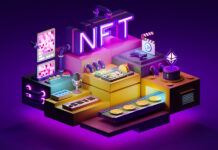Indonesia
The recent surge in non-fungible tokens (NFTs) has hit Indonesia with a sense of style. A multi-platform media and entertainment startup recently put a digital artwork titled Baduy, picturing a man of the local Baduy tribe, for sale as NFTs. Many individual players have embraced this relatively new and unregulated method of blockchain verification, yet still more are wary of its practical implementation, and the implications it may have from a legal standpoint.

Partner at Guido Hidayanto & Partners in Jakarta
Email: naufal.fileindi@lawghp.com
The legal infrastructure in the country seems to want to encompass the unique non-fungible characteristics of NFTs, and the trend will only continue to rapidly progress. Indonesian authorities have taken a measured approach in examining the existence of blockchain technology, leaning more towards embracing the new technology rather than banning it altogether. This can be seen by the approach currently taken for cryptocurrencies and blockchain in general. It will be interesting to see whether NFTs will be managed cautiously, or governed in a sterner manner.
The implementation of blockchain technology is recognised under the current laws and regulations. Most notably, the Indonesian standard industrial business classification code (klasifikasi baku lapangan usaha Indonesia, or KBLI), issued in 2020, has recognised “the development of blockchain technology” as a valid business activity. In addition, blockchain technology is recognised in the provision of supporting services in fund lending for peer-to-peer companies.
Cryptocurrencies are in a unique position in Indonesia’s legal framework. The central bank, Bank Indonesia, through its 2020 regulation of the payment system, prohibits the use of virtual currency, including cryptocurrency, in any kind of payment transaction. However, in parallel with recent developments, the government has started to accept cryptocurrencies, although limited to being a commodity in the futures market. This ultimately makes cryptocurrency, or virtual currency, obsolete as payment transaction methods, but not necessarily as other financial products.

Associate at Guido Hidayanto & Partners in Jakarta
Email: fernanda.dharmawan@lawghp.com
The Minister of Trade Regulation No 99 of 2018, on the general policy of crypto-asset futures trading, categorised cryptocurrencies as futures commodities. The trading of futures commodities in Indonesia is administered by the Commodity Futures Trading Authority (Badan Pengawas Perdagangan Berjangka Komoditi, or Bappebti). Cryptocurrency is a sub-class of crypto assets, but not all crypto assets are cryptocurrencies. In this regard, crypto assets can only be traded via specific merchants, and cannot be used as a payment instrument in Indonesia.
Based on the current regulatory landscape of crypto assets, the NFT has not yet been regulated under Indonesian law. An NFT distinguishes itself from cryptocurrencies as it adopts a non-fungible characteristic. Consequently, the price of an NFT is not determined by the market but by the NFT owner. Therefore, NFTs must be treated differently from cryptocurrencies and, as such, there are several legal issues that must be resolved for the implementation of NFTs in Indonesia.
IP aspects of NFTs
One of the main issues for discussion is regarding the proof of ownership in terms of IP, specifically for copyright matters. Based on the Indonesian Copyright Act, ownership of the NFT may not necessarily mean ownership of the work represented by the NFT, whereas the original artwork, before the NFT is minted, may be protected by the act. If the creator of the original artwork is not the same entity creating or minting the NFT, some copyright issues may arise.
There is a distinction between the NFT and the work represented by the NFT. Owning an NFT is limited to owning the token where such artwork is inserted. Indonesian copyright law may not provide copyright protection to the holder of the NFT, and copyright protection is only provided to the creator of the artwork. It would be interesting to follow further developments regarding IP protection for NFTs, especially whether the copyright law extends to NFTs, and whether NFTs can be used as collateral – as copyright can be used as collateral under the Indonesian copyright law.
Blockchain and NFTs are based on a decentralised system, and consequently jurisdiction will inevitably become an issue. Copyright protection is only provided to the extent that the work is within an Indonesian jurisdiction, or whether Indonesia and the relevant jurisdiction have ratified the relevant and applicable international treaty or convention on copyright protection.
If an NFT creator unlawfully inserts copyrighted work into NFTs, the copyright holder may have the right to sue the NFT creator for infringing copyright. Further, copyright infringement might also be subject to a criminal penalty of imprisonment for up to two years and/or fines up to IDR300 million (USD21,000)
NFT marketplace
NFT marketplaces may also impose a legal issue under Indonesian law. NFT trades will commonly use crypto coins as their currency, as happens within a blockchain ecosystem. This poses an issue under Indonesian law, as the only currency that can be used for exchange is the rupiah.
In a bid to comply with Indonesian law, parties can determine their method of payment. Accordingly, NFT trades can resort to conventional payment methods without needing to utilise crypto coins. An Indonesian NFT marketplace recently has resorted to such conventional payment services for its NFT transactions, which seems to be a means of complying with prevailing laws and regulations.
Additionally, NFT marketplaces face similar jurisdictional issues with IP matters. As NFT marketplaces are decentralised, the applicable law for NFT transactions is unclear. However, under government regulation No 80 of 2019 on trading through electronic systems, foreign businesses will be subject to Indonesian law if they actively engage with Indonesian consumers and meet the criteria on: (1) transaction volume; (2) transaction value; (3) shipping volume; and/or (4) the amount of traffic.
Compliance with Indonesian law includes but is not limited to: (1) obtaining business and technical licences; (2) conducting company registration and mandatory taxation; (3) providing access to the electronic system for the Indonesian government; and (4) implementing consumer protection in accordance with Indonesian law.
NFT marketplaces often employ a smart contract auditing service, CertiK, to assess the level of security and safety of the blockchain. Indonesian law is silent on authentication and verification matters within a blockchain. However, the law obliges electronic system providers to ensure that they can prevent any disturbance, failure and loss.
NFTs could be implemented within the Indonesian legal system through recognition by the government, as was the case with peer-to-peer lending companies at their initial inception. As blockchain technology is relatively new and currently unregulated, the government might impose a regulatory sandbox to assess the reliability of blockchain regarding NFT transactions.
Digital business in Indonesia
NFTs are a part of the digital business in Indonesia, as are other digital and technology companies. The main concern for digital companies conducting business in the country, including big tech companies, is the requirement to comply with several statutory obligations, which in practice may not seem practicable and raises more concerns.
For instance, the Minister of Communication and Informatics Regulation No 5 of 2020 on electronic system providers in the private sector stipulates that all Indonesian and foreign individuals and/or entities that provide, manage and/or operate electronic systems must register as an electronic system provider.
Such a requirement applies to all electronic platforms (websites and applications) conducting activities in Indonesia, irrespective of the location of the server, or the location of the entity itself. Therefore, organisers of NFT transactions and/or marketplaces may be obliged to register their electronic system with the relevant authorities.
Apart from the electronic systems registration requirements, tax is also imposed for digital goods. Major tech companies that meet a certain threshold have had tax obligations imposed for the past couple of years, and this has been fully implemented among major tech companies.
More tech companies have such requirements imposed in the following months. Whether NFT trading will comply with the above-mentioned requirements remains to be seen – while non-compliance to the relevant Indonesian regulations may lead to temporary suspension and/or access blocking.

Guido Hidayanto & Partners
World Trade Centre 3, Level 27
Jl. Jend. Sudirman Kav.29-31, Kuningan
Jakarta – 12920 Indonesia
Tel: +62 21 5011 0199
Email: info@lawghp.com
www.lawghp.com




























